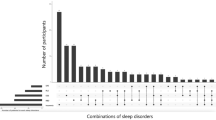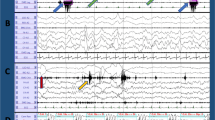Abstract
Sleep disorders are common complaints in patients with neurodegenerative diseases such as spinocerebellar ataxia type 3 (SCA3) or Machado–Joseph disease (MJD)—SCA3/MJD. We evaluated the frequency of sleep disorders in SCA3/MJD patients against controls matched by age and gender, and correlated data with demographic and clinical variables. The main sleep disorders evaluated were rapid eye movement (REM) sleep behavior disorder (RBD), restless leg syndrome (RLS), and excessive daytime sleepiness (EDS). We recruited 40 patients with clinical and molecular-proven SCA3/MJD and 38 controls. We used the following clinical scales to evaluate our primary outcome measures: RBD Screening Questionnaire, International RLS Rating Scale, and Epworth Sleepiness Scale. To evaluate ataxia-related motor and non-motor features, we applied the International Cooperative Ataxia Rating Scale, the Scale for the Assessment and Rating of Ataxia, and the Unified Parkinson’s Disease Rating Scale part III. Psychiatric manifestations were tested with the Hamilton Anxiety Scale, and Beck Depression Inventory. The frequency of RBD and RLS were significantly higher in the SCA3/MJD group than in the control group (p < 0.001). There was no difference between both groups with regard to EDS. The accuracy of RDBSQ to discriminate between cases and controls was considered the best area under the ROC curve (0.86). Within-SCA3/MJD group analysis showed that anxiety and depression were significantly correlated with RDB, but not with RLS. Additionally, depression was considered the best predictive clinical feature for RDB and EDS.

Similar content being viewed by others
References
Schols L, Bauer P, Schmidt T, Schulte T, Riess O. Autosomal dominant cerebellar ataxias: clinical features, genetics, and pathogenesis. Lancet Neurol. 2004;3:291–304.
Rüb U, Brunt ER, Deller T. New Insights into the pathoanatomy of spinocerebellar ataxia type 3 (Machado Joseph disease). Curr Opin Neurol. 2008;21:111–16.
Schols L, Haan J, Riess O, Amoiridis G, Przuntek H. Sleep disturbance in spinocerebellar ataxias—is the SCA 3 mutation a cause of restless legs syndrome? Neurology. 1998;51:1603–07.
Reimold M et al. Spinocerebellar ataxia type 1, 2 and 3 and restless legs syndrome: striatal dopamine D2 receptor status investigated by [11C]raclopride positron emission tomography. Mov Disord. 2006;21:1667–73.
D'Abreu A, Friedman J, Coskun J. Non-movement disorder heralds symptoms of Machado Joseph disease years before ataxia. Mov Disord. 2005;20:739–41.
D'Abreu A, França Jr M, Conz L, et al. Sleep symptoms and their clinical correlates in Machado–Joseph disease. Acta Neurol Scand. 2009;119:277–80.
Iranzo A, Munoz E, Santamaria J, et al. REM sleep behavior disorder and vocal cord paralysis in Machado–Joseph disease. Mov Disord. 2003;18:1179–83.
Iranzo A. Sleep and breathing in multiple system atrophy. Curr Treat Options Neurol. 2007;9:347–53.
Schols L, Linnermann C, Globas C. Electrophysiology in spinocerebellar ataxias: spread of disease and characteristic findings. Cerebellum. 2008;7:198–03.
Vecchierini MF. Sleep disturbances in Alzheimer's disease and other dementias. Psychol Neuropsychiatr Vieil. 2010;8:15–23.
Videnovic A, Leurgans S, Fan W, Jaglin J, Shannon KM. Daytime somnolence and nocturnal sleep disturbances in Huntington disease. Parkinsonism Relat Disord. 2009;15:471–74.
Friedman JH, Fernandez HH, Sudarsky LR. REM behavior disorder and excessive daytime somnolence in Machado–Joseph disease (SCA-3). Mov Disord. 2003;18:1520–22.
D'Abreu A, França Jr MC, Paulson HL, Lopes-Cendes I. Caring for Machado Joseph disease: current understanding and how to help patients. Parkinsonism Relat Disord. 2010;16:2–7.
Braga-Neto P, Godeiro-Junior C, Dutra LA, Pedroso JL, Barsottini OGP. Translation and validation into Brazilian version of the Scale of the Assessment and Rating of Ataxia (SARA). Arq Neuropsiquiatr. 2010;68:228–30.
Schmitz-Hubsch T et al. Scale for the assessment and rating of ataxia—development of a new clinical scale. Neurology. 2006;66:1717–20.
Stiasny-Kolster K, Mayer G, Schafer S, et al. The REM sleep behavior disorder screening questionnaire – a new diagnostic instrument. Mov Disord. 2007;22:2386–93.
Masuko AH, Carvalho LB, Machado MA, et al. Translation and validation into the Brazilian Portuguese of the restless legs syndrome rating scale of the International Restless Legs Syndrome Study group. Arq Neuropsiquiatr. 2008;66:832–36.
Allen RP, Picchietti D, Hening WA, et al. Restless legs syndrome diagnosis and epidemiology workshop at the national institutes of health; international restless legs syndrome study group. restless legs syndrome: diagnostic criteria, special considerations, and epidemiology. A report from the restless syndrome diagnosis and epidemiology workshop at the National Institutes of Health. Sleep Med. 2003;4:101–19.
Iranzo A, Comella CL, Santamaria J, Oertel W. Restless legs syndrome in Parkinson's disease and other neurodegenerative diseases of the central nervous system. Mov Disord. 2007;22:424–30.
Frenette E. REM Sleep Behavior Disorder. Med Clin North Am. 2010;94:593–14.
Dang D, Cunnington D. Excessive daytime somnolence in spinocerebellar ataxia type 1. J Neurol Sci. 2010;290:146–47.
Cecchin CR, Pires AP, Rieder CR, et al. Depressive symptoms in Machado Joseph Disease (SCA3) patients and their relatives. Community Genet. 2007;10:19–26.
Kawai Y, Takeda A, Abe Y, et al. Cognitive impairments in Machado–Joseph disease. Arch Neurol. 2004;61:1757–60.
McMurtray AM, Clark DG, Flood MK, Perlman S, Mendez MF. Depressive and memory symptoms as presenting features of spinocerebellar ataxia. J Neuropsychiatry Clin Neurosci. 2006;18:420–22.
Saute JAM, Silva ACF, Donis KC, et al. Depressive mood is associated with ataxic and non-ataxic neurological dysfunction in SCA3 patients. Cerebellum. 2010;9(4):603–5. doi:10.1007/s12311-010-0205-6.
Yen T, Lu C, Tzen K, et al. Decreased dopamine transporter binding in Machado–Joseph disease. J Nucl Med. 2000;41:994–8.
Remy P, Doder M, Lees A, Turjanski N, Brooks D. Depression in Parkinson's disease: loss of dopamine and noradrenaline innervation in the limbic system. Brain. 2005;128:1314–22.
Acknowledgments
Dr Andre C. Felicio is supported by a doctorate fellowship grant from the “Fundação de Amparo à Pesquisa de São Paulo” (FAPESP). Dr. Gilmar F. Prado is partially supported by the “Conselho Nacional de Desenvolvimento Científico e Tecnológico” (CNPq).
Conflict of interest
We have no conflicts of interest.
Protection of Human Research Subjects and Human Subject Informed Consent
The procedures followed were in accordance with the ethical standards of the responsible committee on human experimentation (institutional and national). All subjects were provided with the approved informed consent.
Author information
Authors and Affiliations
Corresponding author
Rights and permissions
About this article
Cite this article
Pedroso, J.L., Braga-Neto, P., Felício, A.C. et al. Sleep Disorders in Machado–Joseph Disease: Frequency, Discriminative Thresholds, Predictive Values, and Correlation with Ataxia-Related Motor and Non-Motor Features. Cerebellum 10, 291–295 (2011). https://doi.org/10.1007/s12311-011-0252-7
Published:
Issue Date:
DOI: https://doi.org/10.1007/s12311-011-0252-7




